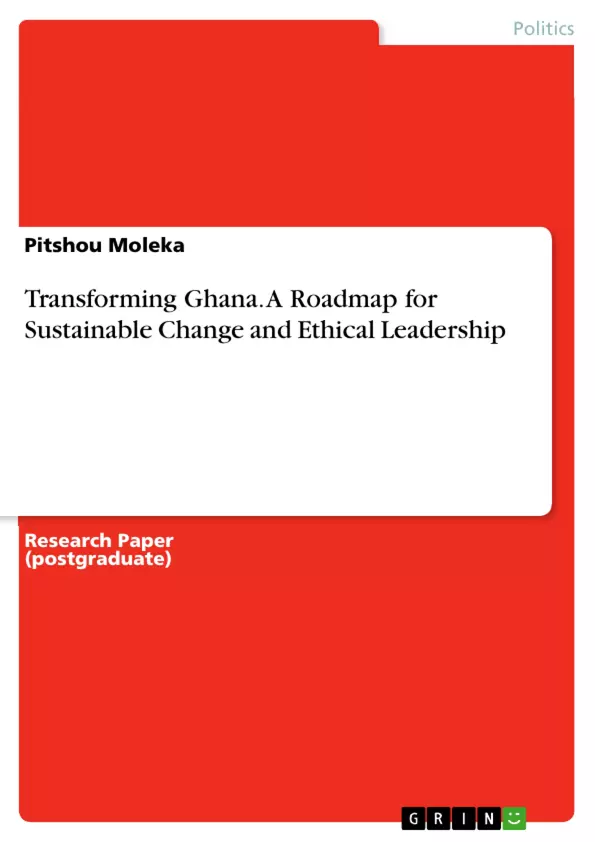Ghana, the pioneering nation of African independence, now stands at a historic crossroads. Faced with the multifaceted challenges confronting the continent - deepening poverty and inequality, environmental degradation, and political instability - the country has a unique opportunity to emerge as a model of transformation and inspiration for the rest of Africa. Catalyzing this renaissance, however, will require a new generation of visionary, ethical, and transformative leaders capable of driving systemic change and collective action.
This paper explores the pathways for a Ghanaian renaissance, drawing on the country's vibrant forces and a resolutely forward-looking vision. It proposes an innovative and pragmatic roadmap capable of propelling Ghana to the forefront of the continent, across domains as diverse as governance, the economy, education, and environmental protection, with a strong emphasis on the critical role of leadership. Grounded in rigorous academic research and drawing on cutting-edge theories of development, sustainability, and leadership, this work offers a comprehensive and interdisciplinary perspective on the challenges and opportunities facing Ghana.
Inhaltsverzeichnis (Table of Contents)
- Introduction
- Part 1: Reinventing Governance for Exemplary Democracy and Accountable Leadership
- Chapter 1 - From Political Stability to Democratic Consolidation and Responsive Leadership
- Chapter 2 - Decentralization, Inclusive Local Development, and Empowered Community Leadership
- Chapter 3 - Education, Active Citizenship, and the Development of Future Leaders
- Part 2: Reinventing Economic Models for Sustainable, Inclusive, and Entrepreneurial-led Development
- Chapter 4 - Economic Diversification, Ecological Transition, and Innovative Green Leadership
- Chapter 5 - Sustainable Agriculture, Food Security, and Community-Driven Agricultural Leadership
- Chapter 6 - Innovative Financing for Development and Visionary Financial Leadership
- Part 3: Regenerating Natural Ecosystems for Enhanced Resilience through Collaborative Environmental Leadership
- Chapter 7 - Preservation and Restoration of Forests via Sustainable Stewardship
- Chapter 8 - Sustainable Water Resource Management through Integrated and Participatory Leadership
- Chapter 9 - Climate Change Adaptation and Nature-Based Solutions under Adaptive Leadership
Zielsetzung und Themenschwerpunkte (Objectives and Key Themes)
This book explores pathways for a Ghanaian renaissance, proposing an innovative roadmap to propel Ghana to the forefront of Africa across governance, economy, education, and environmental protection. It emphasizes the critical role of leadership in driving systemic change and collective action. Grounded in academic research and cutting-edge theories, the work offers a comprehensive and interdisciplinary perspective on Ghana's challenges and opportunities.
- Reinventing governance for exemplary democracy and accountable leadership
- Reinventing economic models for sustainable, inclusive, and entrepreneurial development
- Regenerating natural ecosystems for enhanced resilience through collaborative environmental leadership
- The pivotal role of leadership in catalyzing transformative change across various sectors
- Highlighting successful models and best practices from Ghana and across Africa
Zusammenfassung der Kapitel (Chapter Summaries)
Chapter 1: Examines Ghana's political trajectory, from periods of instability to its current democratic status. It analyzes the challenges and opportunities for further democratic consolidation and accountable leadership.
Chapter 2: Discusses decentralization, inclusive local development, and the empowerment of community leadership in Ghana.
Chapter 3: Focuses on the role of education and active citizenship in developing future leaders for Ghana.
Chapter 4: Explores economic diversification, ecological transition, and innovative green leadership strategies for Ghana's development.
Chapter 5: Examines sustainable agriculture, food security, and community-driven agricultural leadership.
Chapter 6: Addresses innovative financing for development and visionary financial leadership in Ghana.
Chapter 7: Deals with the preservation and restoration of forests through sustainable stewardship.
Chapter 8: Focuses on sustainable water resource management through integrated and participatory leadership.
Chapter 9: Addresses climate change adaptation and nature-based solutions under adaptive leadership.
Schlüsselwörter (Keywords)
Ghana, visionary leadership, transformative leadership, democratic consolidation, sustainable development, economic diversification, ecological transition, environmental stewardship, inclusive development, community leadership, education, active citizenship, food security, innovative financing.
- Quote paper
- Dr Pitshou Moleka (Author), 2024, Transforming Ghana. A Roadmap for Sustainable Change and Ethical Leadership, Munich, GRIN Verlag, https://www.grin.com/document/1503196



